Top Ten Football Books: Tom Flight
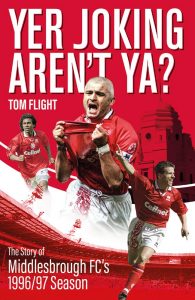 Tom Flight is a Middlesbrough fan who grew up in Teesside and started going to games from the 1994/95 season when Boro’ were promoted to the Premier League. Yer Joking Aren’t Ya?: The Story of Middlesbrough’s Unforgettable 1996/97 is his excellent book, reviewed by FBR, charting the incredible campaign when stars such as Fabrizio Ravanelli and Juninho graced the Riverside Stadium. Tom now lives in the USA but continues to follow the fortunes of Middlesbrough from across the pond.
Tom Flight is a Middlesbrough fan who grew up in Teesside and started going to games from the 1994/95 season when Boro’ were promoted to the Premier League. Yer Joking Aren’t Ya?: The Story of Middlesbrough’s Unforgettable 1996/97 is his excellent book, reviewed by FBR, charting the incredible campaign when stars such as Fabrizio Ravanelli and Juninho graced the Riverside Stadium. Tom now lives in the USA but continues to follow the fortunes of Middlesbrough from across the pond.
Here Tom picks his top ten books, with a very international flavour.
10. The Mixer: The Story of Premier League Tactics, from Route One to False Nines – Michael Cox
Michael Cox has found a way of making tactics writing highly entertaining and readable. It feels like tactical styles and trends are endlessly analysed these days (Sheffield United overlapping centre-backs etc.) so I really enjoyed looking back and see how trends evolved in the early days of the Premier League. This is a book for both the tactics nerd and the 90’s nostalgia fan.
9. Stillness and Speed – Dennis Bergkamp and David Winner
Bergkamp was probably the footballer I enjoyed watching the most as child. This book makes you appreciate his breathtaking technique and style of play even more. Rather than a traditional biography, the unique structure of the book brings you into the mindset of Bergkamp; you learn literally what was going through his head in moments such as when Frank de Boer hit the long-ball in the last minute against Argentina in 1998. The book is a riveting insight into one of the game’s greatest craftsmen.
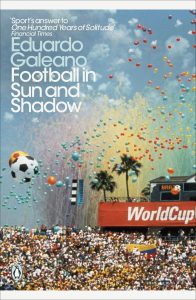 8. Soccer in Sun and Shadow – Eduardo Galeano
8. Soccer in Sun and Shadow – Eduardo Galeano
A poetic history of football. Galeano’s lyrical style makes almost every sentence in the entire book quotable. A legendary Uruguayan man of letters, he was a football fanatic but is never afraid to slip in social commentary and history throughout. Often hilarious, he is also vicious in his attacks of certain figures in the football hierarchy.
7. The Mavericks: English Football When Flair Wore Flares – Robert Steen
I wasn’t alive in the 7’s but I watched a lot of BBC’s Match of the Seventies and re-watched 101 Great Goal VHS’s endlessly as a child. The ‘Mavericks’ described in this book were true characters of the game of which we just don’t see in the game anymore. Steen writes authentic portraits of the rebels who played the game with a swagger and weren’t afraid to give two fingers to the establishment. A work of social history as well as a great football book.
6. Too Good To Go Down: The Inside Story of Manchester United’s Relegation – Wayne Barton
I’m not a Manchester United fan, although I do find them to be a fascinating club and this book covers an extraordinary chapter in their history. When I was researching my own book I was trying to read books about focused on English clubs or on a specific season in a club’s history as inspiration, and I read some of Wayne Barton’s book and I found this book on Manchester United’s fall from grace after the 1968 European Cup Win to relegation and subsequent rebound under Tommy Docherty to be an absorbing read. His follow-up covering the Atkinson era is superb also.
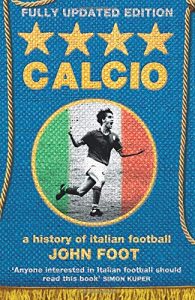 5. Calcio: A History of Italian Football – John Foot
5. Calcio: A History of Italian Football – John Foot
As a fan of Italian football since watching Football Italia on Channel 4 I found this book to be an absolutely captivating history of the Italian game. It gives great insight into the rivalries, the corruption and also how the defensive style of Italian football developed and thrived.
4. God Is Round – Juan Villoro
“Reality gets better in the writing of it,” Villoro writes. Sometimes I think I enjoy reading about football more than watching it and this book is a good example of why. A series of enchanting essays, this book will help rekindle any loss of enthusiasm for the game.
I’ll read anything Simon Kuper writes, and Football Against The Enemy is a big favourite of mine. I’ll pick this book for my top ten simply because it changed the way I thought about the game and challenged many preconceptions I had. The chapter on penalty kicks is particularly memorable.
2. Angels With Dirty Faces: How Argentinian Soccer Defined a Nation and Changed the Game Forever – Jonathan Wilson
Inverting the Pyramid changed the way I watched and thought about football. After reading that book I felt like I knew everything about football. But pretty soon I realised the book actually opened up just how much there was to learn about the game. That book just made me want to read more about football, and read books such as this amazing book. An enthralling history of Argentina and the nations unique relationship with football. I’ve always been fascinated with Argentinian football and I’m so pleased this book exists.
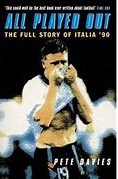 1. All Played Out – Pete Davies
1. All Played Out – Pete Davies
The first World Cup of my life-time was Italia 90. I have no memory of it being three-years-old at the time, but my brother taped a 1-hour BBC review of the tournament I must have re-watched it easily over 100 times in my childhood. The tournament seemed like the most epic, breathtaking, emotional, important thing in the world.
Two decades later I read All Played Out and through his eye-witness account I saw that the tournament was every bit as exhilarating as it had existed in my childhood imagination. As Davies writes, he was “In the heart, now, of the greatest drama on earth.” Just a wonderful book.
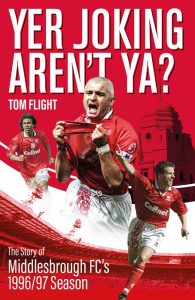 As football in the Premier League and the Championship prepares to return after the COVID-19 outbreak, titles, promotions, and relegations will be fought for behind closed doors. For Middlesbrough, the remaining nine games are vital as they look to ensure their survival in the Championship. Ahead of this unusual end of season, FBR caught up with Tom Flight (TF) who has released a book about an incredible season in the Boro’s history.
As football in the Premier League and the Championship prepares to return after the COVID-19 outbreak, titles, promotions, and relegations will be fought for behind closed doors. For Middlesbrough, the remaining nine games are vital as they look to ensure their survival in the Championship. Ahead of this unusual end of season, FBR caught up with Tom Flight (TF) who has released a book about an incredible season in the Boro’s history.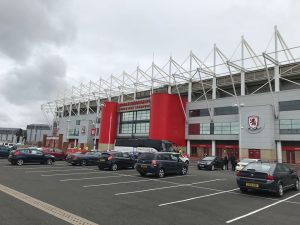 (FBR): In the first season back in the Premier League, Middlesbrough finished 12th, was there a sense of optimism at the start of the 1996/1997 season?
(FBR): In the first season back in the Premier League, Middlesbrough finished 12th, was there a sense of optimism at the start of the 1996/1997 season?